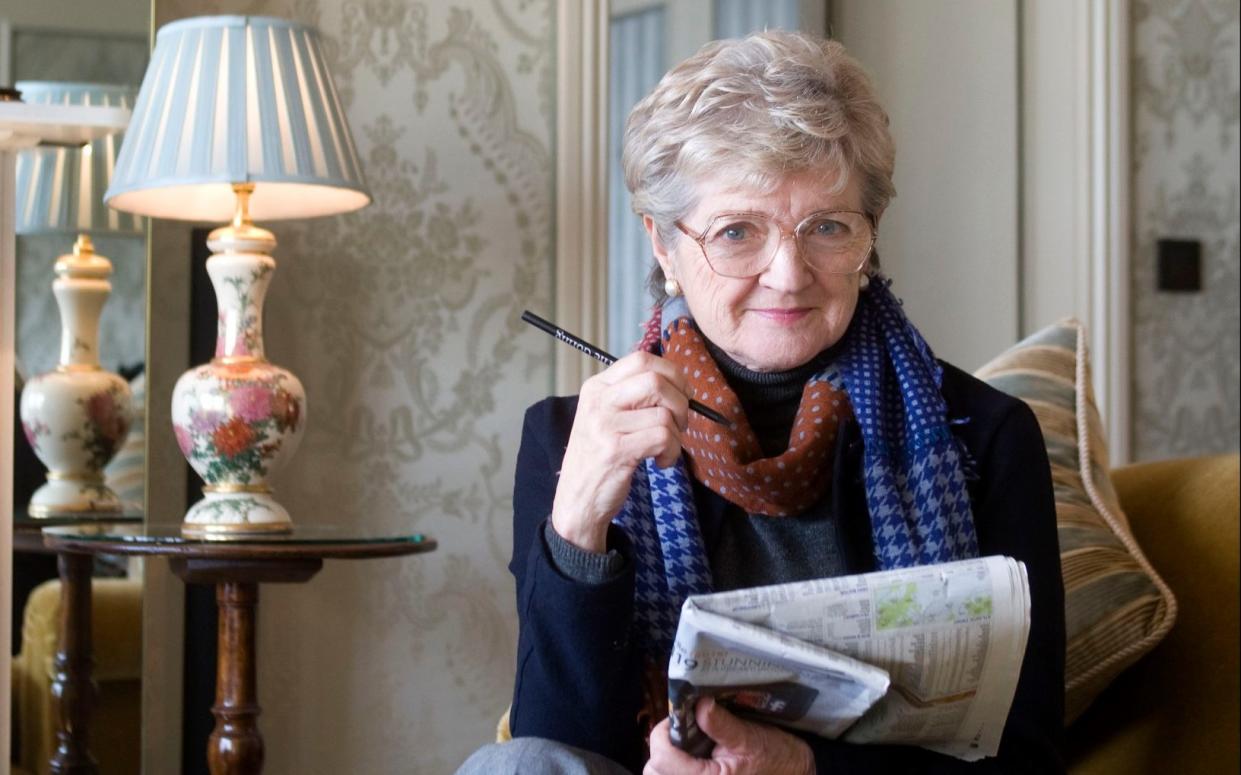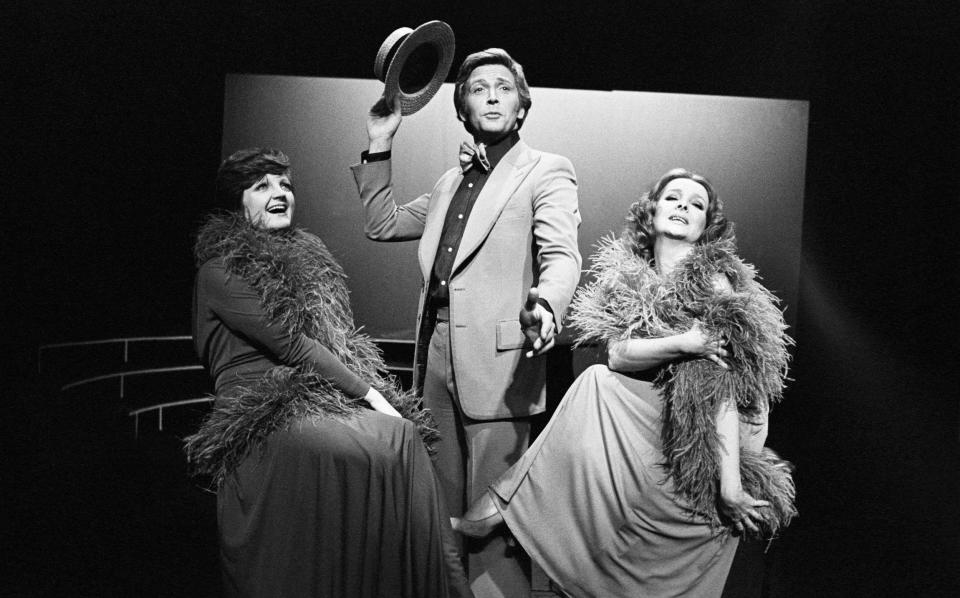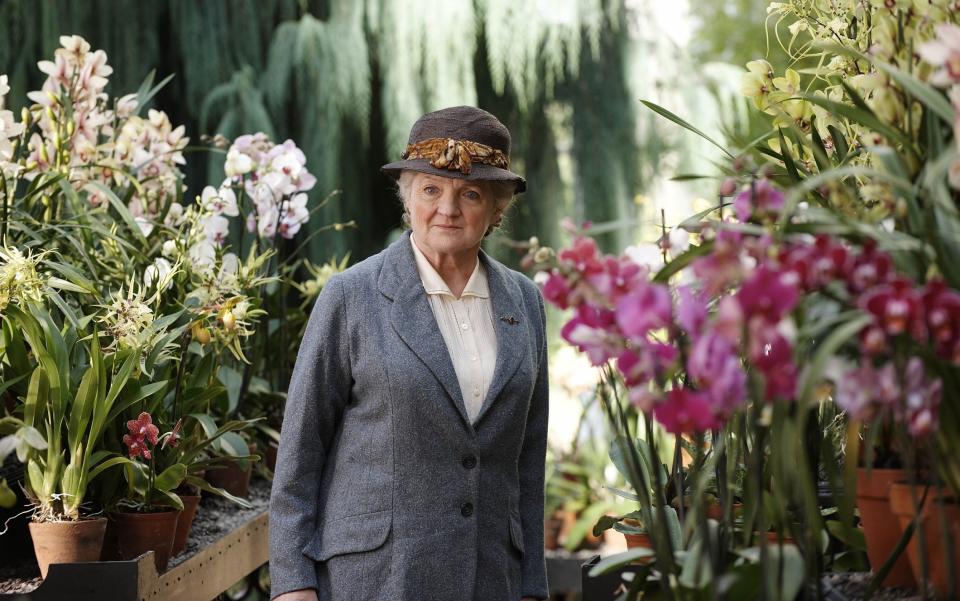Miss Marple’s Julia McKenzie: ‘I'm feeling more alive than I have for a long time’

“None of Stephen Sondheim’s characters ever say the words ‘I love you’ to each other,” points out Julia McKenzie. “His musicals were so much more sophisticated than that.”
To prove her point, McKenzie quotes a line from Follies – in the original London production of which she starred 36 years ago – her eyes glittering as she nails the punctuation with steely precision: “All that time wasted,/Merely passing through/Time I could have spent so content/Wasting time with you.” Then she smiles, nods and sips her tea. “That’s got everything, hasn’t it?”
I’ve come to meet her during rehearsals for Stephen Sondheim’s Old Friends: a gala celebration of the late composer’s best-loved songs that McKenzie is co-directing with renowned choreographer Matthew Bourne. As a fan of her sweetly steely turn as Miss Marple (whom she played on ITV from 2009 to 2013) I can’t help feeling that hearing the 82-year-old actress unpack a lyric is like listening to Christie’s detective solving a crime.
Having appeared in Sondheim musicals since 1971, she tells me that his syntax is now “in my bones, my soul, my muscle memory”, known as deeply as Marple knew the secrets of St Mary Mead. All that baffling love, death, sex and betrayal becoming politely obvious – “Don’t you see, my dear?” – on the lips of the shrewd old lady in the neatly knotted neckerchief.
She’s so evidently enjoying herself – gossiping with the cast and relentlessly topping up the rehearsal room’s stash of sweets – that it’s hard to believe that McKenzie officially retired seven years ago when her husband, American actor-director Jerry Harte, became gravely ill and she “thought there was just no question of me continuing to work”. Then, after Harte’s death in 2018, “I didn’t really feel like it all. I decided to stay at our little house in Devon, where Jerry died.”

But then, theatrical impresario and longtime Sondheim backer Cameron Mackintosh got in touch to ask if McKenzie would help Bourne “polish some little bits around the edges, chip in from the sides”. And, before she knew it, she was ensconced in a smart London hotel – “rather nice not to have to do the shopping or the hoovering!” – spending her days teaching the show’s younger cast members all about her “charming, excitable” old friend Stephen and “making sure nobody was tinkering with the words, because I am a stickler!”
McKenzie is, with typical modesty, downplaying her role. “I wouldn’t have done it without her,” Bourne tells me. “Coming from the dance world, I know very little about the technicalities of singing. And I never met Sondheim. Julia brings all that expertise and understanding with her – as well as nipping off to make me coffee when that really isn’t her job!”
Although she achieved mainstream fame opposite Anton Rodgers as Hester, the quirky middle-class housewife in 1980s sitcom Fresh Fields, McKenzie has always been happier in the theatre. She rattles off tales of backstage camaraderie and the friendships she’s developed with the likes of Maureen Lipman and Judi Dench. “Judi is very musical,” she tells me. “Although she’s very firm about other people not touching her crossword!”
Born in Enfield in 1941, McKenzie admits to being “a bit of a show-off” as a child who loved the theatre, “but I was advised to go into teaching, like so many girls back then”. She was headed for a career as a French teacher when a county music advisor from Middlesex heard her sing a solo at a school speech day and, on the spot, promised to give her a four-year opera scholarship if she could get through the entrance exams at the Guildhall School of Music & Drama.
She shrugs: “Well, I didn’t come from that sort of background at all. I couldn’t read music well – and I was still not good at it even after four years of studying – but I got in, and that changed my life.”

At the Guildhall, McKenzie quickly decided that opera wasn’t for her. “I spent a lot of time with my nose pressed up against the windows of the drama studio, wanting to act,” she says. “In those days the arts were very separate. They said: ‘Go away, you’re a singer!’”
Undeterred, she managed to steer herself a course out of opera into operetta, then on to musicals. She was soon appearing in the West End, with parts in Maggie May (1966), Mame (1969) and then the original 1971 London production of Sondheim’s Company. “I wasn’t used to the energy of American performance at all,” laughs McKenzie, “On opening night I felt as though I’d been fired out of a cannon!”
Nominated for a record-breaking 14 Tony Awards and winning six, Company centres on a single man, turning 35, looking at the couples in his life and weighing the pros and cons of settling down. In it, Sondheim – then a closeted gay man whose childhood had been rocked by his parents’ divorce – unpicks the romantic myth of happy-ever-after. Broadway audiences baulked at its cynicism but, McKenzie argues: “It’s sensible to be a little cynical.”
Bourne feels that: “We Brits have always understood Sondheim best. His sophistication works well for us.” Yet, as a young gay man, before he really understood the history, he recalls being “faintly annoyed” by Sondheim. “I had come out and I was irritated that Sondheim kept writing about marriage because I thought – ‘That’s not your story!’” But, in looking more closely at the songs, he found himself moved by the finely balanced “beauty and realism” in Sondheim’s work.
Although she identifies herself as a lifelong “Sondheim nut”, McKenzie won’t be performing in the new show because, she says, her voice has gone and she now only sings “in the shower or when I’m hoovering”. Despite her many TV and theatre roles, she tells me that today she is mostly recognised in public for her starring role in the 2013 BBC film of David Walliams’s Gangsta Granny.

“Grown men run up to me in the street and shout ‘Gangsta Granny!’,” she chuckles. “I remember going for a coffee with Jerry just after it came out and these 10-year-old boys kept staring at me. I had a little chat with them and asked if the film had made them behave more kindly to their own grannies and they said no! Little buggers at that age, kids!”
McKenzie says she was “unfortunate” not to have had children of her own, but she has always found a “family of sorts” in theatre companies. Indeed, Bourne describes her role on the Sondheim production as that of “a mother, or a favourite aunt – if your favourite aunt has all the gossip about working with Ginger Rogers”.
Although she has always worked primarily as an actress, McKenzie has also been directing since the 1980s, starting in 1984 with a production of Stepping Out, a tap-dance-based comedy written by her friend, Richard Harris. “We were all on the beach one day when he said he was struggling to find the right director. I told him he should get a woman, because the play was about women and I didn’t think a man could really appreciate how women behave together without a man in the room.” Harris asked her to do it – and she had a blast.
Despite never having directed before, she says: “I knew what to do. If you understand the subject of a play then it’s not so difficult.” She shrugs. “I don’t think we need to make such a fuss about the title of ‘director’. That word makes it sound like you’re the king or queen of everything – and you’re not.”
When it comes to putting on Sondheim – who once gave her a gold horseshoe brooch that she’s always been too scared of losing to wear – McKenzie thinks there’s even less for the director to do. Although Bourne will bring his usual, innovative staging to the show, she says she’s advising the actors that her old friend Stephen “gives you everything. Just put the key in the lock once you’ve found the right door. I’m just here guiding people towards the right doors.”
Does McKenzie think the experience will bring her out of retirement more permanently? “Well, I do feel things blossoming. I’m feeling more alive than I have for a long time.” She smiles and finishes her tea. “Actors never retire,” she says. “We just make an exit and close the door.”
Stephen Sondheim’s Old Friends is at the Gielgud Theatre, London W1 (sondheimoldfriends.com) from Sept 21–January 6

 Yahoo News
Yahoo News 
